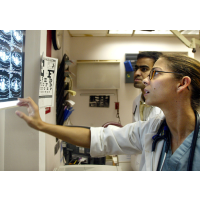Female Doctors Earn Substantially Less than Male Colleagues
 (photo: Mario Tama, Getty Images)
(photo: Mario Tama, Getty Images)
By Catherine Saint Louis, New York Times
Female physicians at some of the nation’s most prominent public medical schools earn nearly $20,000 less a year on average than their male colleagues, according to an analysis published Monday in JAMA Internal Medicine.
Before adjusting for factors that could influence income, the absolute difference between the genders was more than $51,000 a year, the researchers found.
Several studies have found a persistent pay gap between male and female doctors. But those reports relied mostly on doctors reporting their own incomes, or focused on pay disparities in one specialty or one region, or on starting salaries.
The new study draws on salary information from a much larger, objective sample. The researchers went to great lengths to account for a variety of factors that can influence income, such as the volume of patients seen by a physician and the number of publications he or she had written.
Medical professionals greeted the results with exasperation.
“It’s 2016, and yet in a very methodically strong, large study that covers a broad swath of the country, you’re still seeing at the very least a 10 percent difference in what men and women take home,” said Dr. Molly Cooke, a professor of medicine at the University of California, San Francisco, who has studied salary disparities among physicians.
Dr. Vineet M. Arora, an associate professor of medicine at the University of Chicago, wrote an editorial accompanying the study.
“This paper is going to make women academic physicians start a conversation with their institutions to promote transparency and gender equality, because at the end of the day, it’s not fair,” she said in an interview.
The analysis included data on roughly 10,000 physician faculty members at 24 medical schools, including those of the University of North Carolina and the University of Washington. Researchers at Harvard Medical School and Massachusetts General Hospital relied on public databases of employee salaries in 12 states, and data from Doximity, a networking site for physicians, to adjust for factors that can influence income — years since residency, specialty and age, for instance.
Only public medical schools, not private ones, were included, because states like Florida and Texas post employee salaries online.
After adjusting for a variety of factors, the researchers found that female neurosurgeons, cardiothoracic surgeons and women in other surgical subspecialities made roughly $44,000 less than comparable men in those fields.
The average pay gap between female and male orthopedic surgeons was nearly $41,000. The difference was about $38,000 among oncologists and blood specialists, about $36,000 among obstetrician-gynecologists and $34,000 among cardiologists.
Radiology was the only specialty in which women were paid more. Their adjusted average salary exceeded that of male radiologists by roughly $2,000.
Pay differences by gender appeared across all faculty ranks. Full female professors made roughly the same income ($250,971) as male associate professors ($247,212) despite outranking them.
The study’s limitations included a lack of information about who was on a tenure track. More important, reported incomes in some states may not include all payments to physicians, but both men and women are likely to have been affected by such an exclusion.
The researchers also found stark variations in the salary gap at different medical schools, suggesting some address pay inequities more aggressively than others.
“The biggest surprise is there are some schools where this doesn’t seem to be an issue,” said Dr. Anupam B. Jena, the study’s lead author and an associate professor of health care policy at Harvard Medical School.
At two medical centers in the West, female physicians were paid roughly $54,000 and $59,000 less, on average, than their male counterparts. At two schools, there was little income difference. Jena declined to the name the schools.
“What policies, procedures, leadership or culture at these sites helps to counteract a gender pay gap?” Arora asked in her editorial.
Cooke said her salary had been corrected twice by university administrators — once after research she helped conduct revealed pay disparities among physicians in the late 1980s.
She attributes the persistent pay gap partly to the complicated and individualized nature of academic salaries, as well as a lack of transparency.
A subtle bias against women often is a factor, she said, “until a periodic study comes along, where people go, ‘Oh, my God, it’s happening, again.'”
In the worst cases, the pay gap exists because of “clear discrimination by department chairs in salary settings,” Jena said.
But he also suggested that two other factors may play a role. Men and women may negotiate differently, and “male physicians may be more aggressive in terms of obtaining outside salary offers,” he said.
“Extremely helpful” research like Jena’s keeps the issue in the public eye, said Dr. Kim Templeton, president of American Medical Women’s Association and a professor of orthopedic surgery at the University of Kansas, which contributed data to the study.
“But just having it out there isn’t going to fix the problem.”
To Learn More:
Sex Differences in Physician Salary in US Public Medical Schools (by Anupam B. Jena, MD, PhD; Andrew R. Olenski, BS; and Daniel M. Blumenthal, MD, MBA, JAMA Internal Medicine)
Gender Pay Gap Outlives Reasons Thought to Have Caused It (Claire Cain Miller, New York Times)
Gender Pay Gap Exists in Every U.S. Industry (by Noel Brinkerhoff and Steve Straehley, AllGov)
Wage Gap between Men and Women Drops to “Only 21%” (by Noel Brinkerhoff, AllGov)
Increase in Female Physicians Drives Doctors’ Political Contributions to Democrats (by Noel Brinkerhoff, AllGov)
- Top Stories
- Unusual News
- Where is the Money Going?
- Controversies
- U.S. and the World
- Appointments and Resignations
- Latest News
- Trump Orders ICE and Border Patrol to Kill More Protestors
- Trump Renames National Football League National Trump League
- Trump to Stop Deportations If…
- Trump Denounces World Series
- What If China Invaded the United States?






Comments